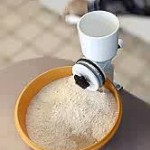[caption id="attachment_144" align="alignright" width="166"] 14 cups flour from 10 cups wheat[/caption]
A Ten Cup Grind-
Turning a grinder for 2 or 3 revolutions is one thing. Grinding a full cup of wheat is a very different thing, and grinding enough wheat to make a nice batch of bread is quite another thing. Grinding 10 cups of wheat on different grinders has given us some idea of what different grinders were like for large amounts of wheat.
Grinding Wheat Is Work
The first thing people need to know is that grinding wheat can be a lot of work. Wheat kernels should be hard and will take some amount of energy to turn it into soft, powdery flour. As the tests results will show, some manual grinders require much less energy than others.
Three Important Things To Consider About A Grinder:
14 cups flour from 10 cups wheat[/caption]
A Ten Cup Grind-
Turning a grinder for 2 or 3 revolutions is one thing. Grinding a full cup of wheat is a very different thing, and grinding enough wheat to make a nice batch of bread is quite another thing. Grinding 10 cups of wheat on different grinders has given us some idea of what different grinders were like for large amounts of wheat.
Grinding Wheat Is Work
The first thing people need to know is that grinding wheat can be a lot of work. Wheat kernels should be hard and will take some amount of energy to turn it into soft, powdery flour. As the tests results will show, some manual grinders require much less energy than others.
Three Important Things To Consider About A Grinder:
 14 cups flour from 10 cups wheat[/caption]
A Ten Cup Grind-
Turning a grinder for 2 or 3 revolutions is one thing. Grinding a full cup of wheat is a very different thing, and grinding enough wheat to make a nice batch of bread is quite another thing. Grinding 10 cups of wheat on different grinders has given us some idea of what different grinders were like for large amounts of wheat.
Grinding Wheat Is Work
The first thing people need to know is that grinding wheat can be a lot of work. Wheat kernels should be hard and will take some amount of energy to turn it into soft, powdery flour. As the tests results will show, some manual grinders require much less energy than others.
Three Important Things To Consider About A Grinder:
14 cups flour from 10 cups wheat[/caption]
A Ten Cup Grind-
Turning a grinder for 2 or 3 revolutions is one thing. Grinding a full cup of wheat is a very different thing, and grinding enough wheat to make a nice batch of bread is quite another thing. Grinding 10 cups of wheat on different grinders has given us some idea of what different grinders were like for large amounts of wheat.
Grinding Wheat Is Work
The first thing people need to know is that grinding wheat can be a lot of work. Wheat kernels should be hard and will take some amount of energy to turn it into soft, powdery flour. As the tests results will show, some manual grinders require much less energy than others.
Three Important Things To Consider About A Grinder:
- Flour Fineness: One important thing about a grinder is how finely it grinds. It should grind at least a little bit fine in order to get a good loaf of bread. See our flour fineness chart for more information on this.
- Grinding Speed: Another important factor is the difference in the speed different grinders process wheat into flour. Of course, the shorter the time, the better.
- Pressure Required To Crank The Grinder: There can be a huge difference in the turning of the handle on hand grinders. Certainly if the handle is hard to turn, it would require more energy in grinding. Logic would seem to say that it takes a given amount of energy to grind a cup of wheat to a certain fineness. The easier a grinder turns the slower one would think it grinds and vice versa. Because of the different stone and burr designs, this is not the case. There is a huge difference between the different grinders in how much work must be expended to create the same fineness of flour.
- The Hopper Size: People with little or no experience with manual grain grinders incorrectly assume the hopper size is very important because if the grinder has a small hopper they are going to have to stop and fill the hopper more frequently. This is faulty thinking because it takes such a long time to grind a cup of wheat even with the very best grinders that the time it takes to stop and throw another cup or two in the hopper amounts to nothing. Interestingly enough, one of the best grinders and the very worst grinder have the same hopper size. Don't be fooled by this. Hopper size doesn't matter.
- The Way It Looks: There are pretty grinders and there are ugly grinders. Modern grinders have coating on them to allow easy cleaning and long term ability. But don’t rule out ugly grinders that may do a good job.
- Grit In The Flour: The American Dental Association had made a statement that's often repeated by numerous dentists, "You shouldn't use stone ground flour because the grit the stones leave in the flour will wear your teeth down." This might be true of stone ground flour in the third world where native populations use two rocks to grind their meal, but it is not true of these modern grinders. Aluminum oxide stones are Extremely Hard. After the break in period, these stones will not wear down. Many people who have motorized their manual grinders and people who own electric grinders with aluminum oxide stones have individually put tons of wheat through their grinders over many years and their stones are still serviceable. There may there have been people who pull the grinder out of the box, push the directions aside and grind up a cup of flour. Then they never use their grinder again because they found grit in the flour from this first grind. Grinders need to be broken in by putting at least a quart of wheat through them, then discard the flour. After the stones are broken in there will be no more grit.
- Health Concerns About The Stones' Composition; Aluminum Oxide: There has been some conjecture of late concerning the effects of aluminum on our health. The U.S. Government does not believe that aluminum can be absorbed by our digestive systems. Many of us literally eat aluminum every day in some form and many people use aluminum pots. There is valid reason for concern, however, as high amounts of aluminum have been found during autopsies of Alzheimer victims.


